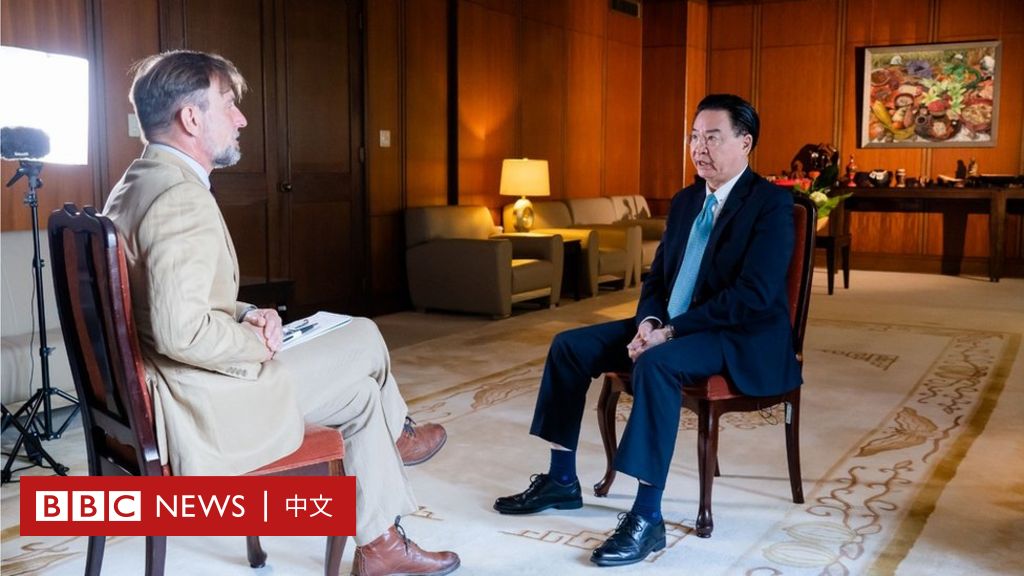- Rupert Wingfield-Hayes
- BBC reporter, from Taiwan
image source,Taiwan Ministry of Foreign Affairs
Wu Zhaoxie said: “It is our own responsibility to defend Taiwan.”
Taiwanese Foreign Minister Wu Zhaoxie recently gave an exclusive interview to the BBC in which he defended the brief but controversial trip to Taiwan by U.S. House of Representatives Speaker Nancy Pelosi.
Wu Zhaoxie condemned China’s large-scale military exercises around Taiwan starting Thursday (August 4).
He said Pelosi’s visit was “significant” and that China’s response would not prevent future democratic political leaders from being invited to visit Taipei.
Wu also warned that China’s territorial goals go far beyond Taiwan.
Video: BBC Interview with Taiwan’s Foreign Minister Wu Zhaoxie
For the past six years, Wu’s public profile has reflected Taiwan’s push for more international recognition. He facilitated Pelosi’s visit and is currently dealing with the rather dire consequences of coordinating the visit.
But the Taiwanese foreign minister did not intend to apologize. Pelosi’s mission is to bring attention to the often forgotten and little-known island.
Beijing sees Taiwan as a Chinese province that will eventually return to China. However, Taiwan considers itself an autonomous island separate from mainland China.
But any hint by world leaders on the issue of sovereignty angers China. China announced on Friday (August 5) that it had imposed sanctions on Pelosi and her family.
Wu Zhaoxie said: “China has long tried to isolate Taiwan internationally.”
“It’s very important that important leaders like Speaker Pelosi have the opportunity to visit Taiwan. It can raise Taiwan’s profile and let the international community know that Taiwan is a democracy.”
He was quick to add that it was not Taiwan that started the crisis, but that Beijing was trying to change the rules.
“We want to maintain the status quo,” he said. “Taiwan has no jurisdiction over mainland China, and the People’s Republic of China has no jurisdiction over Taiwan. That’s the reality.”
What he said was that Chiang Kai-shek, the leader of the Chinese Kuomintang, fled to Taiwan after his defeat in the civil war between the Kuomintang and the Communist Party.
image source,Reuters
The news that the missiles launched by the Chinese military “passed the sky over Taiwan” has attracted the attention of Taiwanese public opinion.
For decades, the two opposing Chinese dictatorships, the nationalist-minded Kuomintang and the communist-minded CCP, faced each other across the sea, and neither was strong enough to attack each other.
But two things have changed over the past 25 years. China has become rich, and Taiwan has moved towards democracy.
Moving towards democracy brought a very different party to power in Taipei – the DPP, led by Tsai Ing-wen and Wu Zhaoxie. They are Taiwanese in their bones, and they no longer believe in Chinese nationalism, but advocate democracy and human rights.
Wu Zhaoxie proudly told me: “In terms of democracy, Taiwan ranks first or second in East Asia.”
“Taiwan ranks first on the Freedom Index, and also on the Economic Freedom Index. The people of Taiwan uphold the values of democracy, freedom, and human rights, which have led Taiwan to a democratic world.”
Indeed, the US non-profit research organization Freedom House lists Taiwan as a “free” region (the organization lists China as “not free” in 2022). And, the Brookings Institution in the United States has largely praised Taiwan’s democratization.
The problem with Taiwan is that mainland China is rich and has used its wealth to build a huge war machine. At the same time, Taiwan has relied on the 100-mile-wide Taiwan Strait and the United States for its security for too long.
Wu Zhaoxie admits that this argument is no longer tenable.
“It is our own responsibility to defend Taiwan,” he said.
“We have the will and the ability. We need other countries to provide Taiwan with defense materials, but it is our responsibility to defend Taiwan, and we do not ask other countries to sacrifice their lives to protect Taiwan.”
It’s brave to say that. Taiwan’s younger generation seems to have a stronger will to fight than their parents’ generation.
image source, Taiwanese Foreign Ministry / Handout via Getty
U.S. House of Representatives Speaker Nancy Pelosi (center) is welcomed by Taiwanese Foreign Minister Wu Zhaoxie (left) after landing at Songshan Airport in Taipei, Taiwan, August 2, 2022.
But computer models show that the People’s Liberation Army can defeat Taiwan’s outdated military in a matter of days. Wu Zhaoxie said that it would be a huge mistake to allow this to happen, and it would only encourage China to go further and further.
He called China’s actions “expansionism.”
“Look at their handling of the Hong Kong issue, or their claims to the East China Sea (as China calls it) and the South China Sea. This is typical of authoritarian expansionism.”
“Countries in this region need to be wary of China’s attempts. Taiwan will not be the last piece of territory for China’s expansionist ambitions.”
Additional reporting by Tiffany Wertheimer.
